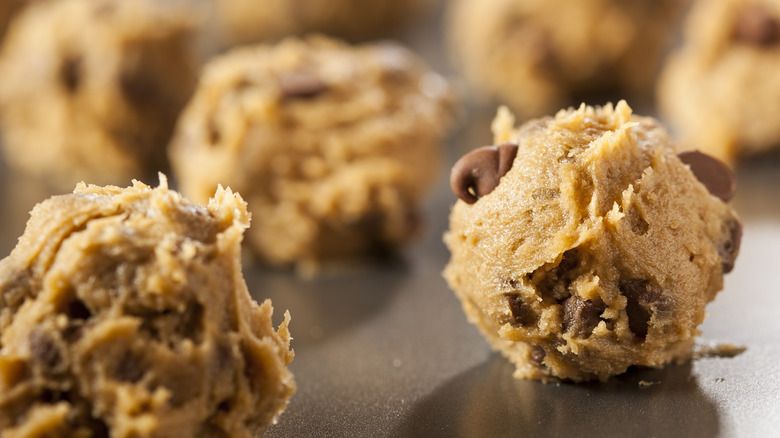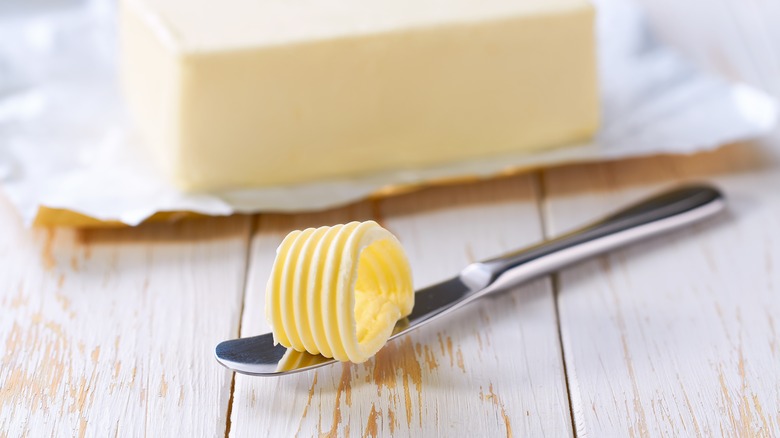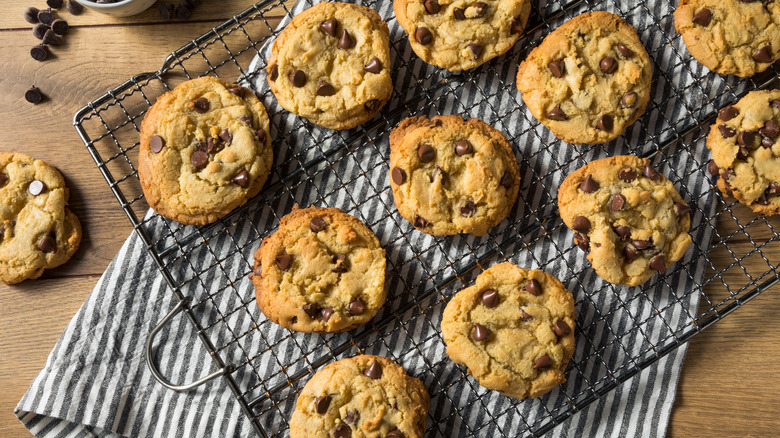You Think You Don't Need To Chill Cookie Dough, But Here's Why You Do
It's a sticky little addendum tacked on to so many cookie recipes: Chill your dough overnight or for at least 30 minutes. These instructions call for a level of patience some home bakers and cookie cravers sorely lack. While this guidance is found in many cookie recipes, you may still be tempted to skip this step in your baking endeavors and go ahead and pop that dough straight in the oven. However, neglecting the vital step of cooling your cookies will stop your recipe from truly living up to its chewy, ooey, gooey potential.
There are some cookies for which chilling isn't recommended. But most recipes, including tangy lemon shortbread and the iconic chocolate chip cookie, can benefit from a good stint in your fridge. Cooling helps to improve both the texture and flavor of these sweet treats, resulting in chewy, less spread-out cookies with a more developed flavor profile. Of course, there are several reasons why cooling your dough can help to improve your next batch. So let's dig into each one.
Harder butter prevents cookies from spreading as they bake
It's more efficient to use room temperature, rather than cold, butter for your cookies, as it blends more easily with sugar, flour, and all the other ingredients. Using room-temperature butter will give your dough an even, airy consistency that will produce uniform cookies. While some malleability is required for the butter to blend into the cookie dough, too much softness is not ideal. If your butter is flat-out melted or too warm, it can cause the cookies to spread out too much as they bake, in turn creating a crispy, uneven texture rather than a soft, chewy consistency. Allowing your dough to cool for a few hours will cause your butter to harden and then slowly melt as your cookies bake. Not only will you be rewarded with round cookies that hold their shape, but they'll also maintain a perfectly soft, chewy texture.
After all, a perfectly baked cookie is simply on another level. The ideal cookie is soft but never cakey in its texture and perfectly able to hold its shape. To achieve a perfectly structured and chewy cookie, you should most definitely pop it in the refrigerator before baking. You should place your dough in the fridge for 30 minutes at the very least. However, if you really want your cookies to hold their shape, a few hours is best, as it will allow your butter to fully re-solidify, preventing unnecessary spreading.
Chilling cookie dough relaxes the gluten
You know how after a hard day of work you just need to unwind? Well, have you ever wondered if your cookie dough needs the same kind of "me-time"? Well, it does. As it turns out, chilling your cookie dough can help it to fully relax before baking. In particular, a little chill session can help those strands of gluten developed during the mixing process to "relax," preventing your cookies from turning out too dense or tough.
Now, gluten isn't always a bad thing while baking. It is essential for making baked goods such as bread. And a certain amount of gluten is vital for a structurally sound cookie. After all, there is a reason why gluten-free cookies can be difficult to master. However, it is a fine balance between good structure and a chewy mess. And chilling out your dough can make finding that balance much easier.
Achieve a better flavor profile by chilling your cookie dough
In addition to creating a softer, better-shaped cookie, cooling your dough can also alter your cookie's flavor profile. Essentially, chilling your dough allows the different flavors to fully meld together. In a chocolate chip cookie, for example, the taste of vanilla will be much more prominent, and the molasses-based brown sugar will also suffuse, creating a much richer, more complex flavor profile. If perfectly layered flavors are your thing, you might also want to try adding some orange zest to your chocolate chip cookies. Pair with an old-fashioned for a truly magical combo.
It isn't just a matter of ingredients permeating your dough, however. Letting your dough rest also helps to remove extra moisture. The longer you chill your dough, the more moisture your flour absorbs and the drier it becomes, and this dryness helps to make the flavors more intense, as there is simply less moisture to dilute the ingredients. This will also increase the sugar concentration in your cookie dough. So, if you have a particular hankering for sweets, you can rest assured that the cookies produced with rested dough will more than satisfy your cravings. All of this adds up to an extraordinary cookie, all thanks to a little chill session in the fridge.



